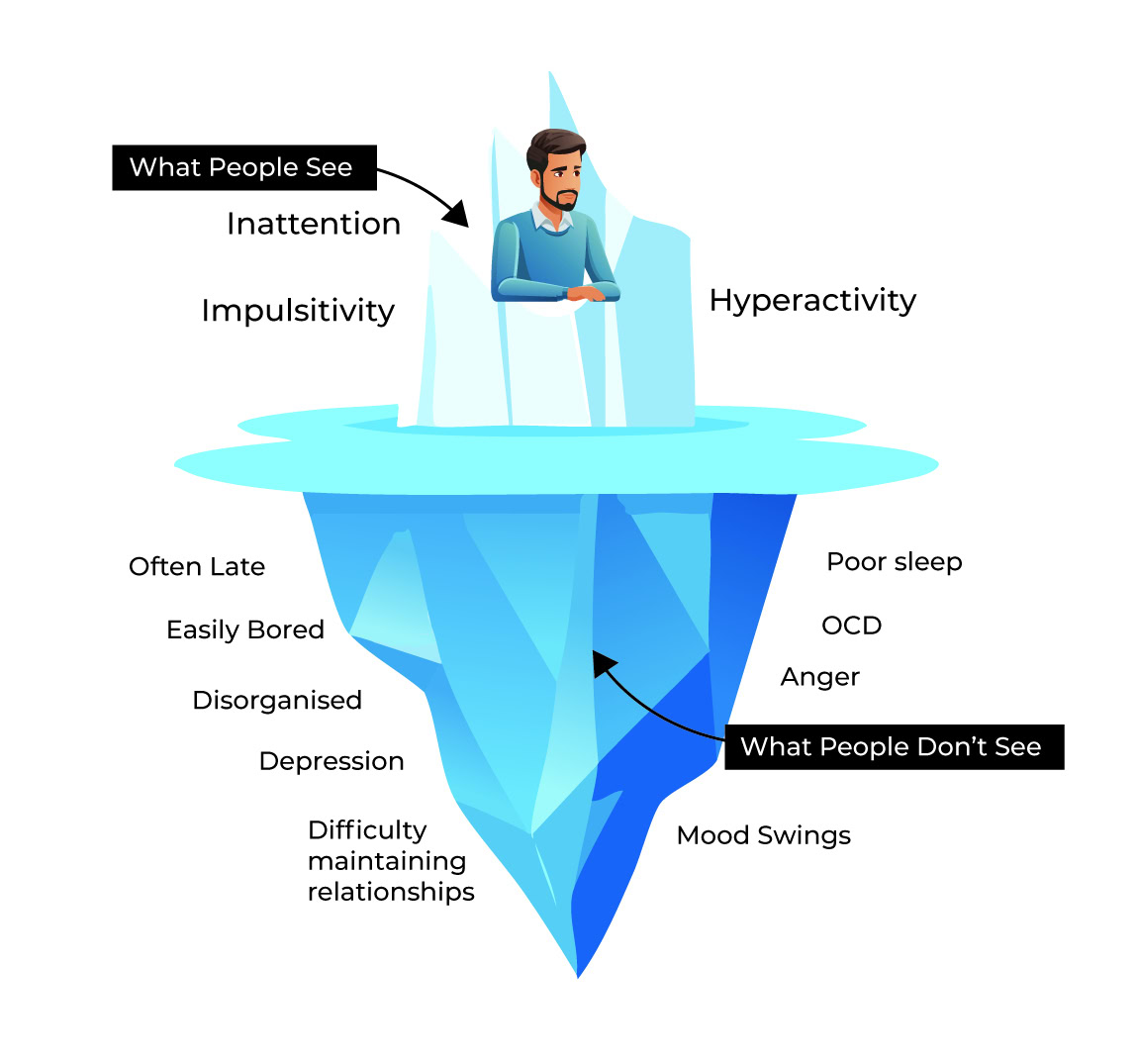Attention Deficit Hyperactivity Disorder (ADHD) is often misunderstood. Many associate it with hyperactivity, forgetfulness, or difficulty focusing, but ADHD is much more complex. It’s like an iceberg—what’s visible on the surface is only a fraction of the struggles happening beneath.
The ADHD iceberg is a concept that helps illustrate how many of the struggles faced by individuals with ADHD are invisible to others. What people see might be impulsivity, distractibility, or restlessness, but what they don’t see are the emotional dysregulation, rejection sensitivity, executive dysfunction, and exhaustion that come with living in a world that is not built for neurodivergent minds.
In this blog, we’ll explore the ADHD iceberg in detail—what’s visible, what’s hidden, and why understanding the full picture is so important for those with ADHD and the people around them.
The Tip of the ADHD Iceberg: What People See
The visible part of the ADHD iceberg consists of symptoms that are most apparent to the outside world. These common traits are often associated with ADHD, particularly in children, but they only scratch the surface of the full experience.
1. Hyperactivity
Hyperactivity is often the first thing people notice. In children, it may manifest as constant movement, fidgeting, or nonstop talking. In adults, it can manifest as internal restlessness, a racing mind, or a need for constant stimulation.
2. Inattention and Distractibility
People with ADHD may struggle to maintain focus, leading to missed details, careless mistakes, and unfinished tasks. This is often misinterpreted as laziness or lack of interest when, in reality, it stems from differences in executive function and dopamine regulation.
3. Impulsivity
Impulsivity can show up in interrupting conversations, making snap decisions without considering consequences or engaging in risky behaviours. In professional or social settings, this may lead to misunderstandings and strained relationships.
4. Forgetfulness and Disorganization
Keeping track of appointments, deadlines, and responsibilities can feel overwhelming. Misplacing items, missing commitments, and struggling with clutter are common challenges—not from carelessness, but due to difficulties in executive function.
5. Procrastination and Poor Time Management
Many people with ADHD experience “time blindness,” making it difficult to judge how long tasks will take. This can result in chronic lateness, last-minute scrambling, or feeling paralyzed by overwhelming tasks.
While these outward symptoms are what others notice, a much larger struggle lies beneath the surface.
Below the Surface: The Hidden Side of ADHD
The deeper, less visible challenges of ADHD are often the hardest to manage—not just because they impact daily life, but because they are rarely acknowledged or understood by others.
1. Emotional Dysregulation
People with ADHD often experience intense emotional reactions and struggle with frustration or stress management. Mood swings and difficulty processing emotions can make everyday situations feel overwhelming.
2. Rejection Sensitive Dysphoria (RSD)
RSD causes extreme sensitivity to criticism, rejection, or perceived failure. A small comment or critique can trigger overwhelming feelings of shame or worthlessness. Many with ADHD either avoid situations where they might be judged or develop perfectionist tendencies to shield themselves from rejection.
3. Executive Dysfunction
Executive function governs planning, prioritizing, and behaviour regulation. People with ADHD may know what they need to do but struggle to start, organize, or complete tasks. This can lead to frustration, especially when the intention is there but the execution feels impossible.
4. Mental and Physical Exhaustion
Navigating a world designed for neurotypical people requires immense effort. Many people with ADHD mask their symptoms, overcompensate, and battle persistent frustration, leading to burnout, chronic fatigue, and sleep difficulties.
5. Anxiety and Depression
The ongoing challenges of ADHD, coupled with societal expectations, can take a toll on mental health. Many individuals with ADHD struggle with low self-esteem, internalizing negative messages about their abilities despite their strengths and potential.
6. Hyperfocus and Task Paralysis
People with ADHD may struggle to focus on mundane tasks but can become completely absorbed in activities they find engaging. This can make it difficult to balance responsibilities, as transitioning between tasks can be challenging.
7. Difficulty with Social Skills and Relationships
Conversational timing, social cues, and maintaining friendships require significant effort for those with ADHD. Romantic relationships may also be affected due to forgetfulness, impulsivity, or emotional intensity.
8. Sensory Sensitivities
Many people with ADHD experience heightened sensitivity to sounds, textures, lights, or smells, making certain environments uncomfortable. Sensory overload can add an additional layer of difficulty to daily life.
These hidden struggles shape the daily experiences of those with ADHD. While outward symptoms may be the most visible, it’s what lies beneath that defines the true ADHD experience.
Why Understanding the ADHD Iceberg Matters
The ADHD iceberg reminds us that ADHD is not just about being restless, distracted, or forgetful. People with ADHD face internal struggles that often go unrecognized, yet these challenges deeply impact their daily lives.
How to Support Someone with ADHD
- Recognize the unseen challenges – ADHD is more than hyperactivity and distractibility.
- Practice patience and compassion – ADHD is a neurological condition, not a choice.
- Avoid harsh criticism – Rejection sensitivity can make even small comments feel devastating.
- Help with executive function challenges – Offer reminders, assist with planning, or break tasks into manageable steps.
- Encourage accommodations – Tools like timers, planners, and fidget devices can make a difference.
- Educate yourself and others – The more we understand ADHD, the less stigma and frustration there will be.
Understanding ADHD Beyond the Surface
The ADHD iceberg is a powerful way to visualize the complexities of ADHD. While some symptoms are visible, many struggles remain hidden. By looking beyond the surface, we can foster greater awareness, acceptance, and meaningful support for those navigating life with ADHD.
At Stone Silo, we recognize both the challenges and strengths that come with ADHD. Our mental wellness experts provide guidance, tools, and strategies to help individuals manage symptoms and build confidence in their daily lives.If you or someone you love is living with ADHD, know that you’re not alone. ADHD isn’t a flaw—it’s a different way of experiencing the world. With the right support, coping mechanisms, and self-compassion, thriving is possible. Let’s continue the conversation and explore strategies that can make a real difference. Contact Stone Silo today to learn more about our ADHD support services.


